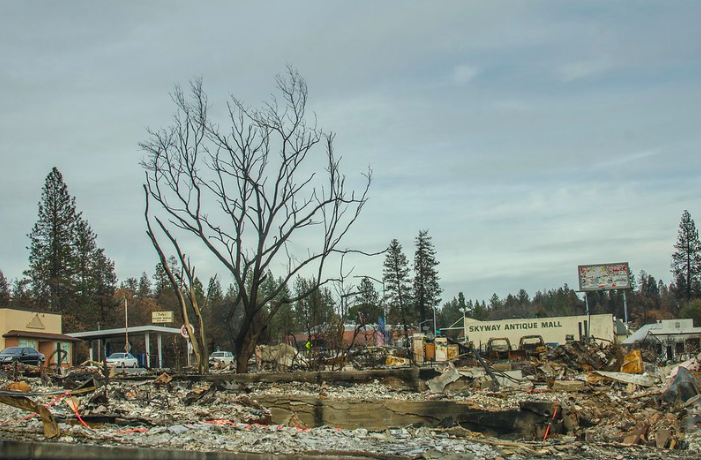Paradise, California

This is a place many say no longer exists. Headlines read, “Paradise Lost: Inside the Burned-out California Town Destroyed by Deadly Fire,” and “‘There’s Nothing Left of This Town,’ Paradise, California, May Never Come Back From the Ashes.” It was a small town; few knew it. It is not an overstatement to say the wildfire put it on the map the same day it wiped it off.
Right now I am staring at a patch of land. Everything is grey. Sky and ground, everything in between. My eyes won’t adjust. Shapes won’t resolve into sense. Here and there are piles of—I don’t know. Junk. Broken things. Melded metal. Monochromatic, indiscernible.
Camouflaged in plain sight I catch something I missed. The shell of a car. And now a burnt out van. A concrete foundation. And over there, a structure. The skeletal frame of a mobile home—I blink and it’s gone, blended in with the trees. I’m having a hard time seeing. I keep thinking I can turn up the contrast like it’s a black and white movie and not a real life nightmare, a modern day Dresden, a contemporary apocalypse. Like it’s not my home address.
I tell myself: Focus on the now. The moment as it stands. Look and see what is here. Don’t overlay it with vestiges of the past. Don’t imbue it with living memory. Don’t project the mind’s eye, or try to see the loss. Just look.
What I see are tree trunks. Hundreds. Black oak, White fir, Ponderosa pine. They are still standing, but they are dead and grey. This one looks scorched, but the burn is white. Here is one that just cracked in half. Jutting out of its middle are shards of new wood. I stare at it a while, the warm brown hue a relief to the eye.
This is a forest. But without signs of life, it’s hard to call it that. No rustle of a squirrel. No bird. There’s hardly a canopy overhead. Only tree trunks remain, pointless and monolithic, adding a layer of metaphysical unease. This place looks like a construction site on the moon. Like a thousand utility poles were haphazardly being erected and halfway through everyone disappeared.
I remember, once, learning to draw. I remember it wasn’t a matter of drawing, but of learning how to see. Now that my family’s house, town, and way of life have burned, they will have to start over, to learn again. To draw up another life.
Some people are going to rebuild in Paradise. Presumably, they are the kind of people who can see the vivid past, see how it continues to emanate even in the bleakness of the present. For them, this place is still a home and a mighty forest, and they might be right—it is only a matter of time before the rain washes away this ash and the birds return and green pokes through the soil. The bears and deer will resume their trails. Paradise is not gone. Its coordinates aren’t missing from lines of longitude and latitude. The land is still here. It is also still here in the memory of the living. In the mind’s eye. In the vestiges of the past and the dreams for the future, superimposed on this patch of scorched earth.
I, too, am one of those people who sees the long view, imagines the far past in what I see every day. And I fall prey to nostalgia, and to its gateway drug, sentimentality. I am inclined to wax poetic about this place, to try to do it justice now that it’s “gone.” But what will that accomplish, tying a heartstring to a place that burns?
It’s time I learn again how to see. To see the reality of this place. Not its charming past as a woodland town, but its present as a burnt out wasteland. And its future as a place that will burn again. There is nothing reassuring about this. But somewhere in all this death, in this forsaken lunar landscape, is a jagged bit of brown, breaking through. For me, it is enough to know that. When a tree falls in these woods, I won’t be there to hear it.
Melissa Mesku is a writer and editor in New York City. Find her on Twitter at @melissamesku




